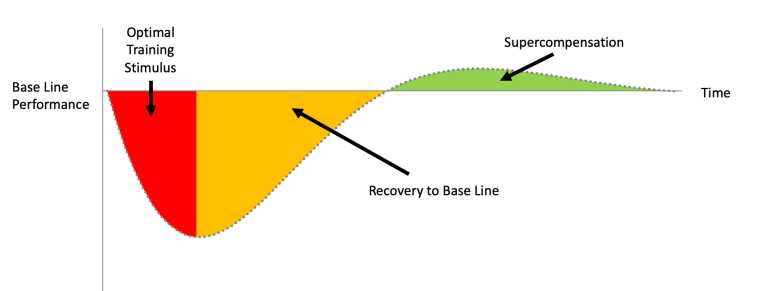
In the previous blog we discussed the benefits of Progressive Overload, but what exactly is the mechanism that drives this progression?
Let’s take a look…
As we engage in physical activity, we expose our bodies to stress/a stressor. With this stress, we force our body to undergo a process of adaptation that enables us to perform more efficiently in the future.
This adaptation is known as the adaptive response and is a key component of any successful training program. Understanding the process of the adaptive response can help us maximize our workouts and achieve our fitness goals more effectively.
The adaptive response is often visualized as a graph that illustrates the three phases that the body goes through after being subjected to a stressor, such as exercise.
This graph includes a training/fatigue phase, a recovery phase, and a super-compensation phase.
The training/fatigue phase:
The body experiences a decrease in performance as it struggles to adapt to the stress placed upon it. This phase is important because it signals to the body that it needs to adapt, in order to perform better next time.
The recovery phase:
It allows the body to recover fully before the next stressor/exercise of the same type. Without sufficient recovery, the body would not be able to adapt and improve its performance.
The super-compensation phase:
When the body has fully recovered and has adapted to the stress we placed on it, we will see an increase in our performance above the baseline level.
One of the key benefits of understanding the adaptive response is that it can help you time your workouts to maximize the super-compensation phase. By spacing out your workouts and allowing for sufficient recovery time, you can ensure that you are training when your body is in the super-compensation phase. This leads to improved performance and faster progress toward your goals.
However, it is important to avoid overtraining. This occurs when you put your body under too much stress without sufficient recovery time. Overtraining can lead to decreased performance, fatigue, and injury.
In conclusion, by understanding the adaptive response, you can avoid overtraining and maximize your results by treading the line between too much recovery/too little stress and too much stress/not enough recovery. Think Goldilocks, there is a sweet spot right in the middle!



